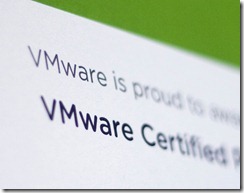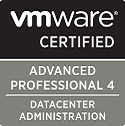 After several months of study (slightly longer than planned due to writing up all my study notes) I was finally notified that I’d passed the VCAP-DCA exam yesterday. Hurrah!
After several months of study (slightly longer than planned due to writing up all my study notes) I was finally notified that I’d passed the VCAP-DCA exam yesterday. Hurrah!
The VCAP-DCA blueprint is pretty comprehensive and for many will involve studying topics they’ve not used before. Regarding the exam itself I have nothing of value to add that hasn’t already been said, but it’s been nice to reflect on what I gained from taking the certification. Given that quite a few recruiters simply state ‘VCP/VCAP/VCDX’ as general requirements for job specs I’m not sure how much value the certification holds in the marketplace yet, but here are the top five ‘wins’ for me as a result of studying;
- PowerCLI. I’ve scripted in many languages over the years but none that are so easy to pick up and achieve results with. I’ve used PowerCLI in production to automate deployments, get weekly reports and automate some compliance work and I doubt I’d have done so much if I didn’t have to cover the VCAP-DCA blueprint (especially the VIX component).
- Distributed switches – my company don’t have Enterprise+ licencing so I don’t get to work with these in a production environment. Lab testing is never the same and the exam highlighted a few areas where I could improve. I like the concept, but with under a hundred hosts I’m not yet convinced of the value for money. Various features and products (vCD comes to mind) are dependant on vDS, so I think it’ll get pushed more and more by VMware however.
- Host profiles – again, I had no real world experience due to licencing restrictions.I did learn that they’re not that great though, even in limited lab testing. There are too many things they can’d do, a fairly limited interface and lack of flexibility. Definitely not the equivalent of Group Policy in an AD environment (which was my mental equivalent).
- ESXTOP. I’ve always been somewhat wary of this, especially after a presentation at the LonVMUG which was very good but hurt my brain! Despite being a Linux admin so comfortable with command line, something about the advanced ESXTOP settings seemed complex and hard to understand. After watching some VMworld sessions and working through the ESXTOP bible it’s now much clearer and I’ve found myself using it far more at work.
- vCenter Heartbeat. Like http://premier-pharmacy.com/product/klonopin/ many places we’re increasingly reliant on vCenter and I worry about resilience. I now know how to use it – and the fact that I probably wouldn’t.
 As with any exam though there are questions which you might not know the answer to, but you know a quick Google would tell you the answer (so have little real value in the exam, in my opinion). These aren’t quite in that category, but here’s three things which I had to learn purely for the sake of the exam;
As with any exam though there are questions which you might not know the answer to, but you know a quick Google would tell you the answer (so have little real value in the exam, in my opinion). These aren’t quite in that category, but here’s three things which I had to learn purely for the sake of the exam;
- Orchestrator. Much though I love automation this isn’t easy enough to use and the reliance on Javascript instead of PowerCLI is a deal breaker for me. I can write Javascript (or use Onyx) but for an admin this is hard to use compared to PowerCLI.
- Fault Tolerance. Due to the 1vCPU restriction I’ve not got any servers which really benefit from this, so it was an exercise (if interesting) in theory only.
- vShield Zones. I’d actually hoped this might be in my top five, but in the end it’s in my bottom three. The interface is incredibly basic compared to any dedicated firewall so I wouldn’t want to use it in production. The exam also only covers v1.0, whereas v4.0 is the current release.
I used a wide variety of study materials, and in order of most beneficial here’s how I’d list them;
- Blogs – these complement the official docs – it’s where people spot the real challenge of a particular feature, or the unspoken gaps not mentioned in the official docs. Start at vLaunchPad.
- Official documentation
- VMworld sessions – free to view (mostly) and focused on particular subjects, these an are often overlooked treasure trove.
- Study notes – creating my own study notes definately helped me remember things, as did other people’s (Sean Crookston’s especially).
- Community forums – both the general vSphere ones and the VCAP-DCA forum are useful places to post questions, and see what everyone else is asking. vicfg-firewall anyone?
- Trainsignal’s Troubleshooting training course by David Davis. The information is very useful and goes above and beyond the blueprint requirements.
And of course I have something to add to the C.V.!
